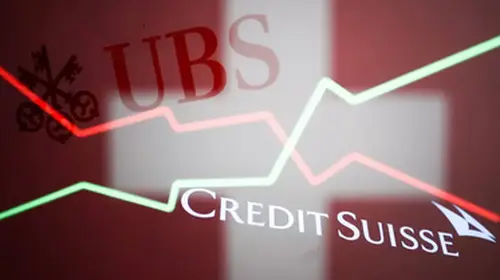
Asia's regulators say banking system is robust and stable after UBS-Credit Suisse takeover deal
Regulators in Asia issued reassuring statements Monday that their banking systems remained robust and stable after Swiss banking giant UBS agreed to buy its rival Credit Suisse for $3.25 billion.
Swiss regulators played a key role in orchestrating the forced takeover, to stem a larger banking crisis that would threaten the global system. The deal was announced before markets opened Monday. Last week, Credit Suisse logged their worst weekly decline since the onset of the coronavirus pandemic.
The developments come shortly after the collapse of Silicon Valley Bank, which led to U.S. regulators backstopping SVB's uninsured deposits and offering new funding for troubled banks. The slew of headlines around the global banking turmoil have heightened volatility and investor fears of a broader crisis.
Hong Kong says industry is resilient
The Hong Kong Monetary Authority said the city's banking sector is resilient with strong capital and liquidity positions. Credit Suisse's operations in the city comprise a branch supervised by the HKMA and two licensed corporations supervised by the Securities and Futures Commission.
"All of them will open for business today as usual. Customers can continue to access their deposits with the branch and trading services provided by Credit Suisse for Hong Kong's stock and derivatives markets," HKMA said.
"The total assets of Credit Suisse, Hong Kong Branch amounted to about HK$100 billion, representing less than 0.5% of the total assets of the Hong Kong banking sector. The exposures of the local banking sector to Credit Suisse are insignificant," it added.
As of the end of February 2023, Credit Suisse was the ninth-largest listed structured product issuer in Hong Kong, accounting for about 4% of the total market in terms of market value of outstanding units, HKMA said.
Singapore says system is stable
In a similar move, the Monetary Authority of Singapore said Credit Suisse operations will continue in the city-state with "no interruptions or restrictions."
Credit Suisse customers will continue to have full access to their accounts and "contracts with counterparties remain in force. The takeover is not expected to have an impact on the stability of Singapore's banking system," MAS said.
MAS added that UBS and Credit Suisse do not serve retail customers, as their primary activities in Singapore are in private banking and investment banking.
The central bank said it will remain in close contact with Swiss regulators, UBS and Credit Suisse as "the takeover is executed, to facilitate an orderly transition, including addressing any impact on employment."
Japan banks 'shielded'
As for Japan, the country's banking system is unlikely to be affected by the deal, said Cyrus Daruwala, managing director of IDC Financial Services.
"I think the exposure to a large wealth manager or an asset manager like Credit Suisse or UBS, in general speaking terms, would be approximately 4% of their portfolio," Daruwala, told CNBC's "Squawk Box Asia" on Monday.

That is not "a significant amount" he added. "Japan, I maintain has been relatively shielded, especially from Credit Suisse."
Australia financials 'strong'
Christopher Kent, assistant governor of the Reserve Bank of Australia, also emphasized domestic banks are robust despite the global panic triggered by banking failures in the U.S.
"Conditions in global bond markets have been strained recently following the failure of Silicon Valley Bank in the United States," he said in a speech on Monday.
"Volatility in Australian financial markets has picked up but markets are still functioning and, most importantly, Australian banks are unquestionably strong."
Banks are already well advanced on their bond issuance plans for the year and could defer "for a while," Kent said. "Even if markets remain strained . . . Australian banks' issuance will continue to benefit from the strength of their balance sheets."
Overall, IDC's Daruwala said banks in the region have "very, very little" exposure to Credit Suisse. "I don't think it's going to cause a ripple effect in Asia at least."






